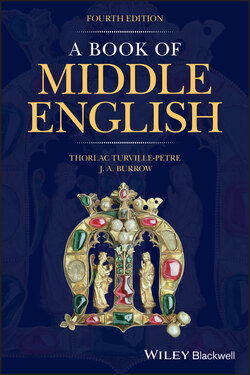Читать книгу A Book of Middle English - J. A. Burrow - Страница 29
4.2.2 Noun Inflexions: Early Southern Texts
ОглавлениеThe system of noun inflexions is one of considerable variety during the Early Middle English period, particularly in the dialects of the South and the South‐West Midlands (texts 2, 3 and 4 in this book). Two basic patterns may be disentangled, principally derived from (a) OE strong masculine nouns (e.g. engel ), and (b) OE weak nouns (e.g. nama). The first pattern has no ending in the nominative and accusative singular, ‐es in the genitive and usually ‐e in the dative; the plural is marked by ‐es, often throughout, although the genitive plural sometimes ends in ‐e or ‐ene, and the dative plural sometimes in ‐e. The second pattern has ‐e throughout the singular, and generally ‐en throughout the plural. Note that in neither pattern is the accusative distinguished from the nominative. As typical paradigms we may set out engel, ‘angel’, as an example of the first pattern, and nome, ‘name’, as an example of the second:
| (a) | (b) | |
| sg.nom./acc. | engel | nome |
| gen. | engles | nome |
| dat. | engle | nome |
| pl.nom./acc. | engles | nomen |
| gen. | engles or engle or englene | nomen |
| dat. | engles or engle | nomen |
Some examples from texts 2, 3 and 4 in this book will better illustrate the wide diversity of noun‐endings in these early texts:
| gen. sg. | havekes, ‘hawk’s’, 2/271; Drihtenes, ‘God’s’, 3/23; helle, ‘of hell’, 4/34. |
| dat. sg. | from þe liʒte, ‘from the light’, 2/198; to Arðure, ‘to Arthur’, 3/1; on his steden, ‘on his horse’, 3/25; in helle, ‘in hell’, 4/41; but wið ʒelp, ‘with boasting’, 4/2. |
| nom./acc. pl. | tide, ‘hours’, 2/26 (OE pl. tīda); crowe, ‘crows’, 2/304 (OE crāwan); wepnen, ‘weapons’, 3/52 (OE wpen); hundes, ‘dogs’, 3/115 (OE hundas); deoflen, ‘devils’, 4/32 (OE dēoflas). |
| gen. pl. | wise, ‘of ways’, 2/20; kingen, ‘of kings’, 3/113; Ancrene Wisse, ‘Anchoresses’ Guide’, 4/title (uninflected form Ancre). |
| dat. pl. | mid þine clivres, ‘with your talons’, 2/84; wit his bridde, ‘with his chicks’, 2/111; smale foʒle, ‘to small birds’, 2/277; mid sweordes, ‘with swords’, 3/69, and yet mid sweoreden, 3/143. |
